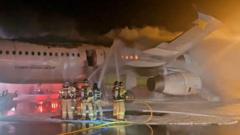An initial investigation suggests a malfunctioning power bank set off a fire in the luggage area of an Air Busan aircraft, resulting in minor injuries to three individuals onboard. On January 28, the Airbus A321ceo erupted in flames at Gimhae International Airport, prompting concerns over lithium-ion battery safety. According to the South Korean transport ministry, analysis pointed to insulation breakdown within the power bank's battery, found near the fire's origin in an overhead compartment. Despite this conclusion, investigators admit they have not identified the cause of the battery's failure. This interim report does not serve as a conclusive accident account. Airlines globally have long prohibited power banks in checked luggage due to their potential to overheat and ignite, a risk substantiated by the International Civil Aviation Organisation's ongoing restrictions. In light of the incident, Air Busan has since reinforced its policies against onboard power banks while other major airlines are following suit, opting for stricter measures regarding passenger battery use. Moreover, the South Korean government has mandated that passengers must keep portable chargers on their person during flights, further addressing the ongoing safety issue surrounding these devices.
Power Bank Suspected in South Korea Aircraft Blaze: Preliminary Findings

Power Bank Suspected in South Korea Aircraft Blaze: Preliminary Findings
Investigators point to a battery malfunction as the likely cause of the Air Busan plane fire at Gimhae International Airport.
Power Bank Suspected in South Korea Aircraft Blaze: Preliminary Findings
Investigators point to a battery malfunction as the likely cause of the Air Busan plane fire at Gimhae International Airport.
An initial investigation suggests a malfunctioning power bank set off a fire in the luggage area of an Air Busan aircraft, resulting in minor injuries to three individuals onboard. On January 28, the Airbus A321ceo erupted in flames at Gimhae International Airport, prompting concerns over lithium-ion battery safety. According to the South Korean transport ministry, analysis pointed to insulation breakdown within the power bank's battery, found near the fire's origin in an overhead compartment. Despite this conclusion, investigators admit they have not identified the cause of the battery's failure. This interim report does not serve as a conclusive accident account. Airlines globally have long prohibited power banks in checked luggage due to their potential to overheat and ignite, a risk substantiated by the International Civil Aviation Organisation's ongoing restrictions. In light of the incident, Air Busan has since reinforced its policies against onboard power banks while other major airlines are following suit, opting for stricter measures regarding passenger battery use. Moreover, the South Korean government has mandated that passengers must keep portable chargers on their person during flights, further addressing the ongoing safety issue surrounding these devices.
Investigators point to a battery malfunction as the likely cause of the Air Busan plane fire at Gimhae International Airport.
An initial investigation suggests a malfunctioning power bank set off a fire in the luggage area of an Air Busan aircraft, resulting in minor injuries to three individuals onboard. On January 28, the Airbus A321ceo erupted in flames at Gimhae International Airport, prompting concerns over lithium-ion battery safety. According to the South Korean transport ministry, analysis pointed to insulation breakdown within the power bank's battery, found near the fire's origin in an overhead compartment. Despite this conclusion, investigators admit they have not identified the cause of the battery's failure. This interim report does not serve as a conclusive accident account. Airlines globally have long prohibited power banks in checked luggage due to their potential to overheat and ignite, a risk substantiated by the International Civil Aviation Organisation's ongoing restrictions. In light of the incident, Air Busan has since reinforced its policies against onboard power banks while other major airlines are following suit, opting for stricter measures regarding passenger battery use. Moreover, the South Korean government has mandated that passengers must keep portable chargers on their person during flights, further addressing the ongoing safety issue surrounding these devices.






















